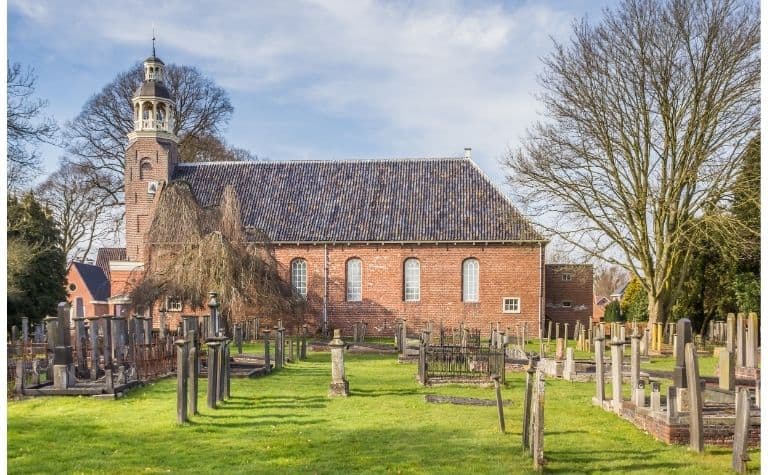The terms “Reformed” and “Presbyterian” are sometimes used as virtual synonyms to describe the same branch of Protestant Christianity. At other times, the words are used in a narrower sense, in which case people can distinguish between them.
“Reformed” describes a Calvinist tradition within Protestant Christianity distinct from Lutheran and Anabaptist branches. “Presbyterian” is the name of a denomination and a form of church government in which elders govern local churches and whose theological convictions are Calvinist.
What are the different ways the term “Reformed” is used in history and theology? Are there other theological traditions within the Reformed tradition other than Calvinism? Why are Presbyterian church governments always Calvinistic? Can they be Arminian, too? Keep reading to learn more.
Also, see Presbyterian vs. Pentecostal: What’s the Difference? to learn more.

What does “Reformed” and “Presbyterian” mean?
The name “Reformed” describes a tradition in Protestant Christianity that consists of different denominations and churches with Calvinistic theological convictions. Yet people use the word with other nuances as well:
| What does “Reformed” mean? | |
|---|---|
| Broad use in Christian history | Some people use the name “Reformed” to distinguish Christian traditions from Roman Catholicism. The “Protestant Reformation” refers to the 16th-century movement that protested abuses in the Catholic church. In this use, “Reformed” describes any tradition or denomination born out of the Reformation, like Lutheran, Presbyterian, and Anabaptist. |
| Broad use in Protestant history | Many people use the term “Reformed” as a synonym for Calvinist. Others use it as a synonym for Presbyterian. There are contexts, however, in which distinctions should be made. For example, a “Reformed Baptist” church isn’t Presbyterian but combines Calvinist theology with congregational church government rather than elder-led (more below). |
| In common use today | Many people use the term “Reformed” as a synonym for Calvinist. Others use it as a synonym for Presbyterian. There are contexts, however, in which distinctions should be made. For example, a “Reformed Baptist” church isn’t Presbyterian but combines Calvinist theology with congregational, rather than elder-led (more below), church government. |
| In narrow use today | Some define “Reformed” in a narrower sense, as in a church or individual subscribing to the Heidelberg Confession of Faith, the Belgic Confession of Faith, and the Canons of Dort. |
Because people use the word “Reformed” in different ways, the intention of the speaker or author is of great importance to understanding its implied meaning.
| What does “Presbyterian” mean? | |
|---|---|
| Broad use | In common usage, the term “Presbyterian” refers to a Christian denomination that is Calvinist in theology. |
| Narrow use | In a narrower use of the term — and the origin of the denominational name — “Presbyterian,” from the Greek word presbyteros meaning “elder,” refers to a form of church government that is elder-led. |

Is Reformed a Denomination?
The name “Reformed,” in general use, doesn’t describe a Protestant denomination akin to terms like Presbyterian, Baptist, Methodist, or Assemblies of God. (Also see Presbyterian Church USA vs. Presbyterian Church in America: What’s the Difference?)
There are, however, networks of churches that use the term “Reformed” in their name, including:
- Associate Reformed Presbyterian Church
- Christian Reformed Church in North America
- Evangelical Association of Reformed and Congregational Churches
- Netherlands Reformed Congregations in North America
- Protestant Reformed Churches in America
- Reformed Church in America
- Reformed Church in the United States
- Reformed Presbyterian Church of North America
- United Reformed Churches in North America
Why isn’t there just one Reformed church? While the churches listed above have more similarities than differences, they don’t agree on all matters of belief and practice.
Additionally, the churches listed above aren’t necessarily due to differences in peripheral matters that turned into church splits. Sometimes the differences come from the region or culture of a church’s origin.
Church historian W.S. Reid explains, “Calvin’s teachings have been followed by many different individuals and groups who came out of the Reformation down to the present day, but they have not always followed exactly the same line of thinking or development.”
He continues, “Thus, in the Reformed tradition, Calvinists, while basically agreeing and resembling each other in many ways, have certain differences produced by historical and even geographical circumstances. These differences have resulted in a number of what might be called lines or strains in the tradition.” [1]
Is Presbyterian a denomination?
In the general use of the term, the name Presbyterian is a Christian denomination. However, in the narrow use of the term, and a more technical sense, the name refers to a tradition that consists of several denominations, including:
- Associate Reformed Presbyterian Church
- Cumberland Presbyterian Church
- Cumberland Presbyterian Church in America
- ECO: A Covenant Order of Evangelical Presbyterians
- Evangelical Presbyterian Church
- Korean American Presbyterian Church
- Orthodox Presbyterian Church
- Presbyterian Church in America (PCA)
- Presbyterian Church USA (PCUSA)
- Reformed Presbyterian Church in North America

What Is Presbyterian Church Government?
From one of the New Testament Greek words for “elder” (presbyteros-singular; presbyteroi-plural), this system of church government emphasizes elders. In the New Testament, “elder” doesn’t necessarily refer to an elderly person but is used to describe an office of church leadership. In the Presbyterian organization, elders lead the church.
Presbyterian government is different than Episcopal and Congregational forms of church government. (Also see Presbyterian vs. Episcopalian: What’s the Difference?) The Presbyterian form of church government is based on verses like,
- Hebrews 13:17, “Obey your leaders and submit to them, for they are keeping watch over your souls, as those who will have to give an account. Let them do this with joy and not with groaning, for that would be of no advantage to you.” (ESV) Presbyterian teaching points out that the word “leaders” is plural, and the description doesn’t easily align with Episcopal or Congregational forms of church government.
- 1 Thessalonians 5:12-13, “But we ask you, brothers, to acknowledge those who work diligently among you, who preside over you in the Lord and give you instruction. In love, hold them in highest regard because of their work. Live in peace with one another.” (ESV) Again, Presbyterian teaching points out that there seem to be multiple leaders exercising oversight of the church at Thessalonica.
Presbyterian churches are independent but associate with other like-minded Presbyterian churches. Each local church elects a “session” to oversee their congregation, which a teaching elder leads.
The presbytery ordains the teaching elder, consisting of ruling elders from other like-minded Presbyterian churches in the same area. (Also see Presbyterian vs. Lutheran; What’s the Difference?)
Are Presbyterian churches always Calvinist? Historically, yes. Calvin didn’t fully develop the Presbyterian governing model, but his followers did. The Presbyterian organization doesn’t necessarily demand Calvinist theology.
After all, it shares many similarities with the Episcopalian church government, whose churches are theologically Arminian.
Are There Presbyterian Churches That Aren’t Reformed?
As explained above, Presbyterian church government and Calvinist theology historically go together. However, in the 21st century, some Presbyterian denominations and traditions are divided over certain theological and social issues. (Also see What Bible Translation Do Presbyterians Use?)
Some liberal and progressive denominations retain the name “Presbyterian,” but they have willfully abandoned the teachings of Calvin and other Reformed thinkers on most doctrines and practices.
In this sense, they can be called “Presbyterian” because of their organization, but they aren’t Reformed or “as Reformed” as they once were. (Also see Presbyterian vs. Methodist: What’s the Difference?)
References:
[1] Evangelical Dictionary of Theology, Walter Elwell, Ed. p. 997.
[2] Source
[3] Source
[4] Source
Related Questions
The Presbyterian and Episcopalian traditions are Protestant branches of the Christian faith that originated in 16th-century Europe. These denominations have much in common, especially when contrasted...
The Roman Catholic and Presbyterian branches of the Christian faith trace their origins to Jesus of Nazareth and his apostles, as well as their writings that comprise most of the New Testament. There...
